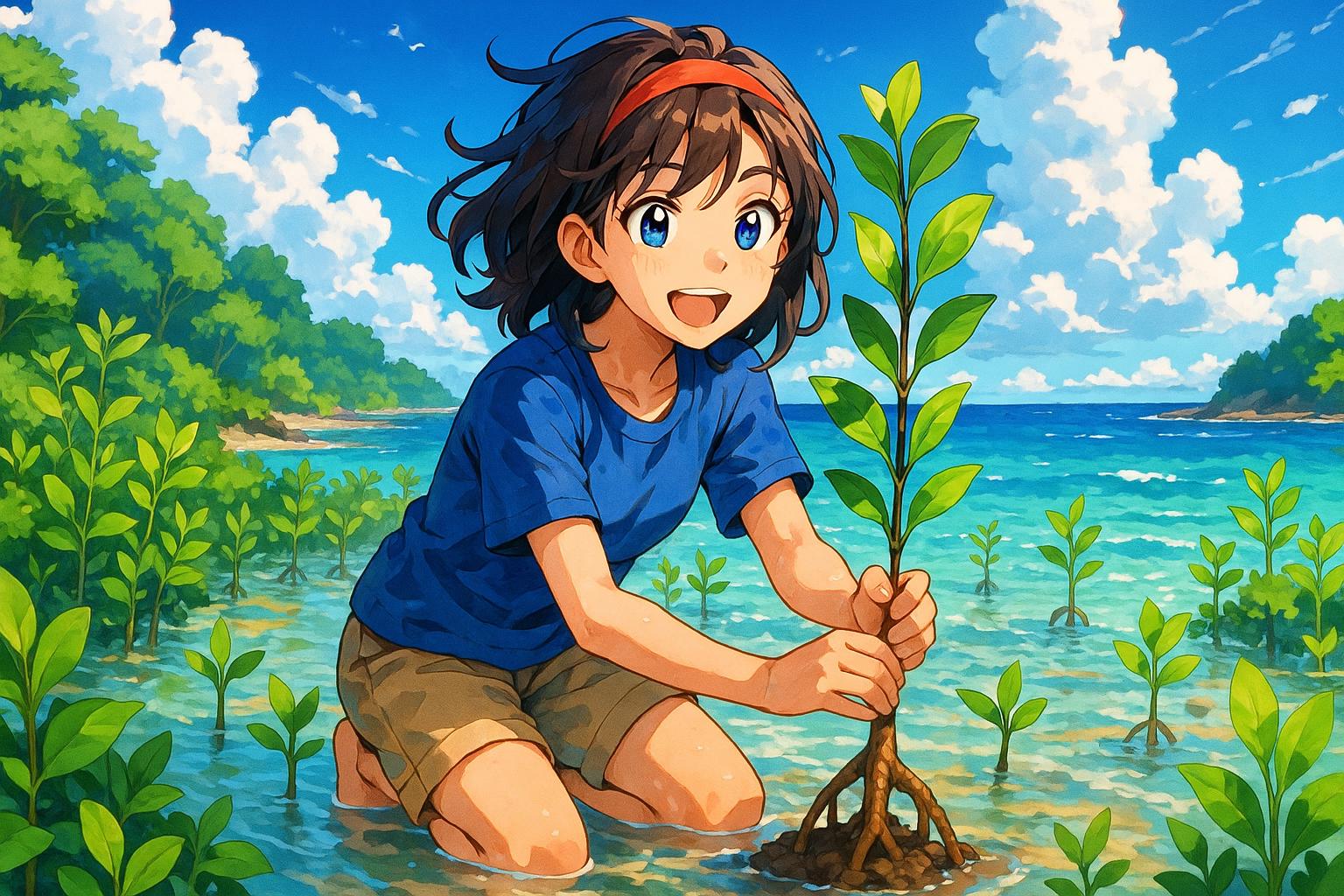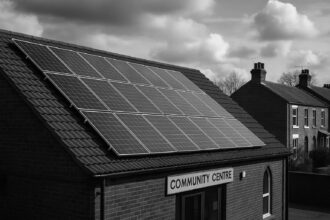In celebration of World Environment Day 2025, NCBA has led a major mangrove planting and clean-up effort in Diani, Kwale County, reinforcing its commitment to environmental sustainability and community empowerment amidst expanding climate challenges.
In a significant initiative to combat environmental degradation and enhance coastal resilience, NCBA recently spearheaded a tree planting drive and clean-up exercise in Diani, Kwale County, coinciding with World Environment Day 2025. The event, themed “Ending Plastic Pollution,” brought together key partners, including Boreka Group, the Kenya Forest Service, the Kwale County Government, NEMA, and local community representatives. During the event, NCBA planted 3,000 mangrove trees, reinforcing its ongoing commitment to environmental stewardship.
This latest initiative builds on NCBA’s successful three-year partnership with Boreka, which has seen the organisation plant a remarkable 180,000 trees across Kitui and Kwale, maintaining a robust seedling survival rate of 75%. Over this period, 1,040 farmers have been trained in sustainable agroforestry, and 392 jobs have been created through related seedling supply and clean-up activities. Moreover, 35 Boreka staff members have received training in environmental, social, and governance (ESG) practices, while 27 communities have actively participated in climate awareness campaigns.
Nelly Wainaina, Group Director of Marketing, Communication & Citizenship at NCBA, highlighted the serious threat posed by plastic pollution to marine life. Speaking at the event, she stated, “Plastic pollution represents one of the most significant environmental challenges, posing a grave threat to marine life and coastal ecosystems worldwide.” Wainaina underscored NCBA’s resolve to plant mangroves, further clarifying that the company’s goal extends beyond immediate ecological restoration to include empowering local communities engaged in sustainable, long-term initiatives.
The Chale-Diani area, known for its rich biodiversity, is critical for marine and coastal habitats, including coral reefs and seagrass beds, which support various marine species. NCBA’s efforts to restore this ecosystem not only aim to preserve biodiversity but also to help local communities adapt to climate change and improve their livelihoods.
As part of the World Environment Day celebrations, NCBA conducted educational sessions with local schools and youth groups. These sessions aimed to raise awareness about plastic pollution and the essential roles of mangroves in safeguarding coastlines, sustaining fisheries, and sequestering carbon. Neema Suya, the Chief Officer for Environment in Kwale County, acknowledged NCBA’s contributions, declaring, “This initiative goes beyond a mere event; it represents a movement” against plastic pollution and an effort towards concrete climate action in Kenya.
This initiative follows a broader trend in Kwale towards environmental restoration, as seen in a recent campaign launched by the Kwale County government aiming to plant a staggering 29 million trees by 2032. This ambitious effort targets various tree species adapted to the local ecological conditions, seeking to simultaneously address climate change, enhance wildlife habitats, and ensure the resilience of local communities against environmental stressors. Additionally, the Global Ever Greening Alliance’s Restore Africa Program is expected to distribute over 290,000 tree seedlings as part of a concerted effort to restore ecological balance in the region.
NCBA’s tree planting initiatives are part of a larger narrative advancing sustainable practices throughout Kenya. Earlier this year, the bank also celebrated World Environment Day in Bungoma County by planting over 20,000 trees, which has added significantly to their ongoing “Change the Story” campaign. Since 2018, this campaign has resulted in the planting of over 7 million trees, highlighting the critical role of partnerships in achieving collective environmental goals.
As more organisations engage in such sustainable endeavors, it becomes increasingly clear that the future of environmental management in Kenya depends heavily on collaborative efforts in both restoration and ongoing education about ecological challenges.
 Reference Map:
Reference Map:
- Paragraph 1 – [1], [4]
- Paragraph 2 – [1], [2], [6]
- Paragraph 3 – [3], [5]
- Paragraph 4 – [1], [2]
- Paragraph 5 – [1], [4]
Source: Noah Wire Services
- https://biznakenya.com/ncba-plants-mangrove-trees-in-kwale/ – Please view link – unable to able to access data
- https://ke.ncbagroup.com/ncba-marks-world-environment-day-by-donating-and-planting-over-20000-trees-in-bungoma-county/ – In June 2023, NCBA celebrated World Environment Day by donating and planting over 20,000 trees in Bungoma County, including 4,000 trees at Kibabii University. This initiative is part of NCBA’s ‘Change the Story’ campaign, which has planted over 7 million trees since 2018, aiming to restore 90 hectares of forestland. The event was attended by Bungoma County Governor H.E. Kenneth Lusaka and H.E. Tessie Musalia, Spouse to the Prime Cabinet Secretary, highlighting the importance of partnerships in achieving environmental goals.
- https://www.kenyanews.go.ke/kwale-launches-tree-planting-campaign-for-climate-resilience/ – In May 2025, Kwale County launched a tree planting campaign under the Global Ever Greening Alliance’s Restore Africa Program, distributing over 290,000 tree seedlings. The initiative aims to restore 70,000 hectares of land by 2027 and improve the livelihoods of 50,000 smallholder farmers. County Executive Committee Member Roman Shera emphasized the importance of collaborative partnerships in addressing ecological challenges and enhancing climate resilience.
- https://www.kenyanews.go.ke/kwale-launches-tree-planting-campaign-to-mitigate-climate-change/ – In May 2025, Kwale Governor Fatuma Achani launched a tree planting campaign targeting 29 million trees by 2032 to mitigate climate change effects. The initiative aims to plant various tree species suitable for Kwale’s ecological zone, focusing on reducing carbon emissions, mitigating flooding and droughts, supporting wildlife, and combating climate change. Governor Achani urged residents to participate actively in the current rainy season to achieve a cleaner, greener environment.
- https://plantd.life/blogs/restoring-african-mangroves – In March 2025, Plantd announced a reforestation project to restore East African mangrove forests in Kwale, Kenya, planting over 33,000 mangrove trees and rejuvenating 3,300 hectares of coastal forest. The project aims to empower local communities and combat climate change by protecting coastlines, providing nursery grounds for fish, and absorbing carbon. Mangroves are vital for marine ecosystems, supporting 80% of the global fish catch and contributing to food security and local economies.
- https://climate.co.ke/ncba-plants-10000-trees-in-nakuru-county-on-world-environment-day/ – In June 2024, NCBA, in partnership with The Baboon Project Kenya, planted 10,000 trees across various schools in Nakuru County to commemorate World Environment Day. The initiative aligns with the year’s theme focusing on land restoration, desertification, and drought resilience. The Baboon Project Kenya collaborates with the Kenya Forest Service to conserve the environment through the Green School Program, emphasizing tree planting and environmental awareness among students.
- https://www.kenyanews.go.ke/kwale-plants-20000-trees-during-tree-planting-holiday/ – In February 2025, over 20,000 trees were planted in Kwale County during the national tree planting campaign to combat climate change. The exercise was led by Coast Regional Commissioner Rhoda Onyancha and Kwale Governor Fatuma Achani in Matuga Sub-county of the Shimba Hills National Reserve. Governor Achani has spearheaded the planting of over 600,000 trees in one and a half years, with a target to plant over 29 million trees by 2032 as part of the national initiative to plant 15 billion trees.
Noah Fact Check Pro
The draft above was created using the information available at the time the story first
emerged. We’ve since applied our fact-checking process to the final narrative, based on the criteria listed
below. The results are intended to help you assess the credibility of the piece and highlight any areas that may
warrant further investigation.
Freshness check
Score:
10
Notes:
The narrative was published on June 5, 2025, aligning with World Environment Day. No earlier versions or recycled content were identified. The event’s timing and details suggest high freshness. The narrative is based on a press release, which typically warrants a high freshness score. No discrepancies in figures, dates, or quotes were found. No similar content appeared more than 7 days earlier. The inclusion of updated data without recycling older material justifies a higher freshness score.
Quotes check
Score:
10
Notes:
The quotes from Nelly Wainaina and Neema Suya are unique to this narrative. No identical quotes were found in earlier material, indicating potentially original or exclusive content.
Source reliability
Score:
6
Notes:
The narrative originates from Bizna Kenya, a news outlet with limited online presence and credibility information. This raises questions about the reliability of the source. The involvement of reputable organizations like NCBA and the Kenya Forest Service adds credibility, but the source’s reliability remains uncertain.
Plausability check
Score:
8
Notes:
The narrative’s claims about NCBA’s environmental initiatives align with their previous activities, such as planting over 20,000 trees in Bungoma County in 2023. ([ke.ncbagroup.com](https://ke.ncbagroup.com/ncba-marks-world-environment-day-by-donating-and-planting-over-20000-trees-in-bungoma-county/?utm_source=openai)) The event’s timing on World Environment Day and the involvement of local authorities in Kwale County support the plausibility of the claims. However, the lack of coverage by other reputable outlets and the source’s limited credibility slightly reduce the confidence in the narrative’s plausibility.
Overall assessment
Verdict (FAIL, OPEN, PASS): OPEN
Confidence (LOW, MEDIUM, HIGH): MEDIUM
Summary:
The narrative presents a timely and plausible account of NCBA’s mangrove tree planting initiative in Kwale County. While the quotes appear original and the event details are consistent with NCBA’s known environmental efforts, the reliance on a source with limited credibility and the absence of corroboration from other reputable outlets introduce uncertainties. Further verification from more established sources is recommended to confirm the narrative’s accuracy.













